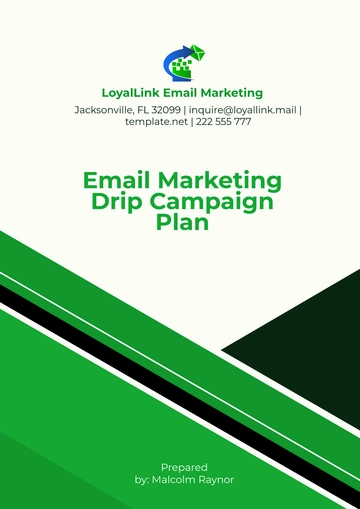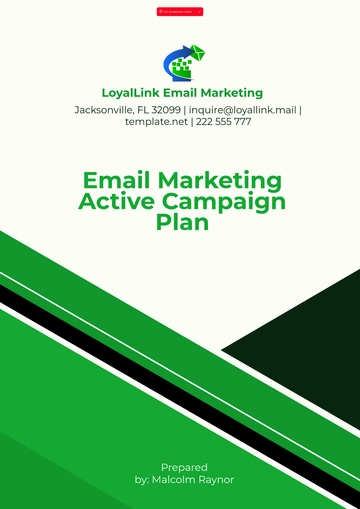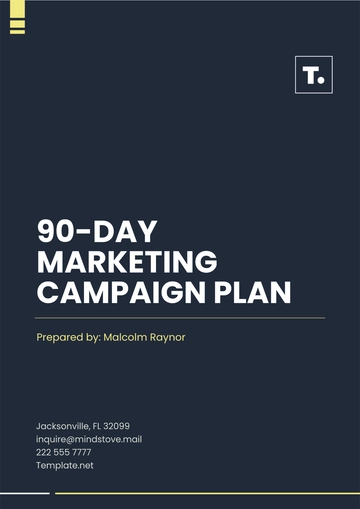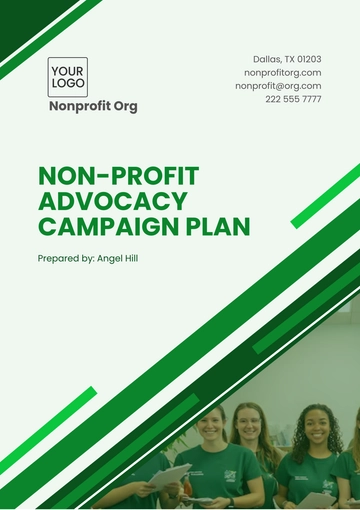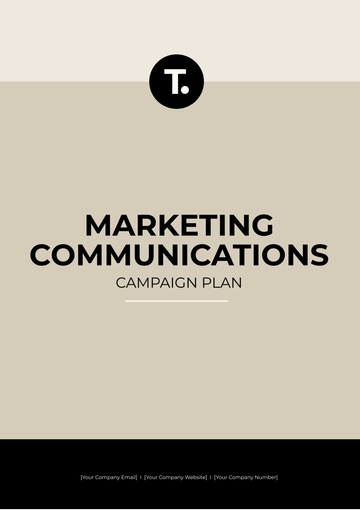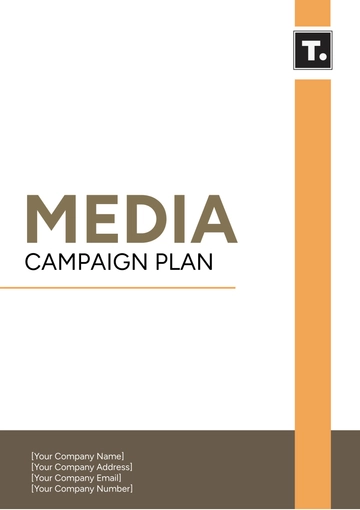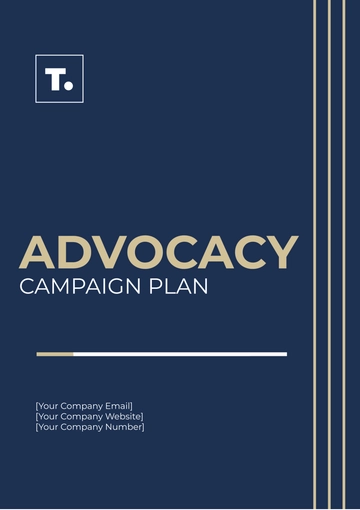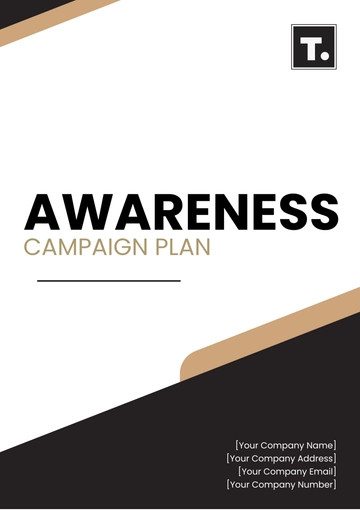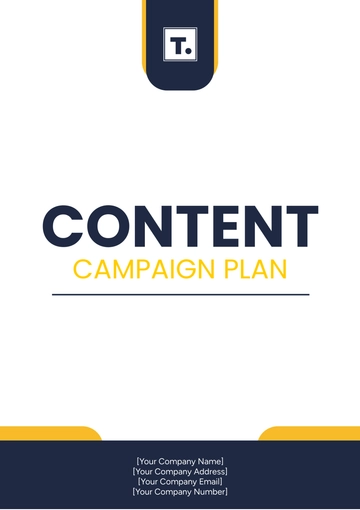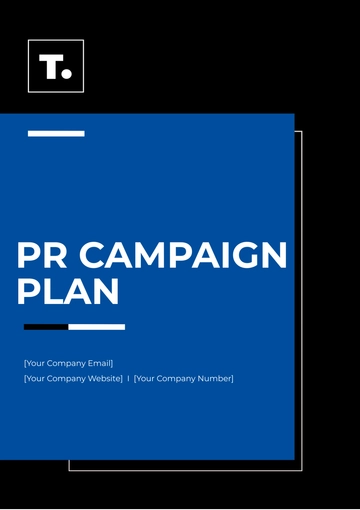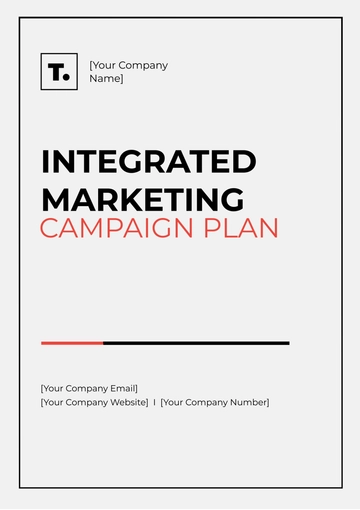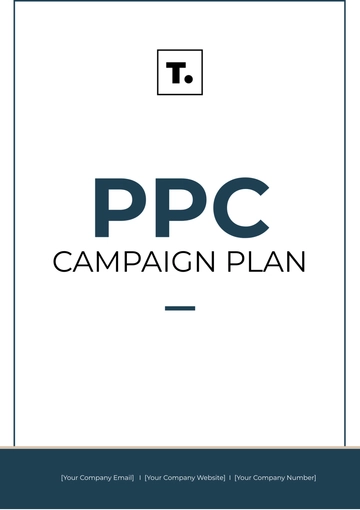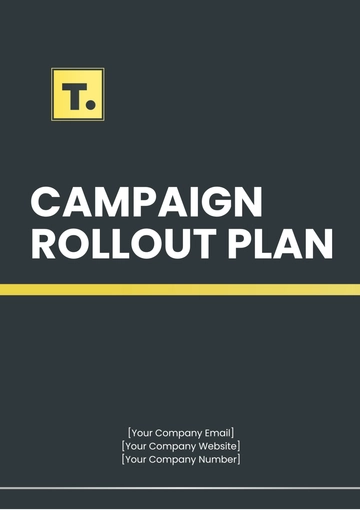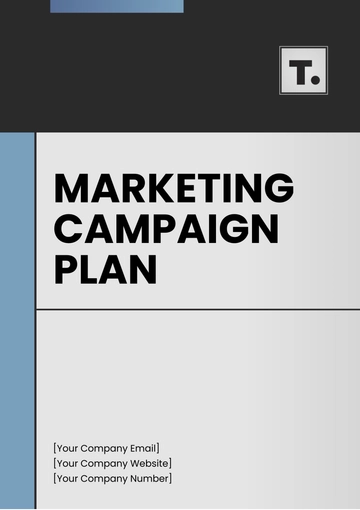Free Professional 90-Day Political Campaign Plan

Prepared by:
[Your Name]
[Your Company Name]
Overview
This 90-day political campaign plan outlines a strategic framework designed to ensure the success of a candidate in a short, intense election cycle. The plan is broken down into three distinct phases: Preparation and Organization, Execution and Outreach, and Final Push and Get-Out-the-Vote. Each phase includes specific goals, actions, and metrics for success, ensuring the campaign remains focused and responsive to evolving challenges.
Phase 1: Preparation and Organization (Days 1–30)
Objective
Build a strong foundation for the campaign by establishing a clear message, solid organizational structure, and initial outreach efforts.
Key Actions
Campaign Team Formation
Hire a campaign manager, communications director, fundraising lead, field organizers, and volunteers.
Assign roles and responsibilities.
Fundraising Setup
Establish a fundraising team and begin identifying key donors.
Set fundraising goals and develop a donor outreach strategy, including events, online campaigns, and direct solicitations.
Develop Campaign Message
Finalize the candidate’s core message, key talking points, and campaign slogan.
Develop messaging tailored to different voter segments (e.g., youth, women, senior citizens).
Set Up Infrastructure
Launch campaign website and social media profiles (Twitter, Facebook, Instagram).
Develop a data collection system for tracking donations, voter outreach, and volunteer engagement.
Create Media and Advertising Strategy
Develop a media plan that includes television, radio, online ads, and direct mail.
Create a content calendar for social media and public appearances.
Metrics for Success
Team roles were filled within the first week.
Fundraising goal of $X within the first month.
Completion of campaign website and social media accounts.
Initial media engagement, including a press release or announcement video.
Phase 2: Execution and Outreach (Days 31–60)
Objective
Execute the campaign’s core strategies, including voter outreach, media engagement, and event planning.
Key Actions
Voter Outreach and Mobilization
Launch door-to-door canvassing in key districts and begin phone banking.
Begin community outreach through town halls, meet-and-greets, and community events.
Deploy field organizers to key areas to build local grassroots support.
Fundraising Campaign
Host fundraising events (virtual and in-person) to meet fundraising goals.
Continue targeting high-value donors and explore new funding channels like PACs or small-dollar donations.
Media Strategy Execution
Start airing television and radio ads, focusing on key messages.
Schedule interviews and appearances with local media outlets.
Increase social media engagement, using video content and live streams.
Polling and Data Analysis
Begin tracking internal polling and feedback to refine messaging.
Adjust outreach strategies based on polling data and early feedback.
Volunteer Mobilization
Recruit and train volunteers for canvassing, phone banking, and event support.
Develop a volunteer management system to track hours, impact, and engagement.
Metrics for Success
Successful completion of key voter outreach events.
Increased social media following and engagement rates.
At least 2 fundraising events completed, meeting or exceeding targets.
Polling data indicate a solid growth trajectory.
Volunteer participation numbers are on track to meet goals.
Phase 3: Final Push and Get-Out-the-Vote (Days 61–90)
Objective
Focus on driving voter turnout and ensuring the campaign is visible and influential in the final days before the election.
Key Actions
Intensified Voter Outreach
Launch final canvassing blitz targeting key swing voters.
Initiate the final round of phone banking, with a focus on reminding voters to go to the polls.
Utilize data from early voting to adjust outreach efforts.
Media Blitz
Air final ads across all media channels (TV, radio, social media).
Ramp up media appearances, including interviews, debates, and press conferences.
Execute a final push on social media with endorsements, testimonials, and voter reminders.
Get-Out-the-Vote (GOTV) Operations
Organize transportation to polling stations for voters who need assistance.
Coordinate final rallies, "last-minute" campaign events, and volunteer mobilization to encourage in-person voting.
Utilize targeted messaging for early voters, absentee voters, and those without a strong affiliation to any party.
Surge Fundraising
Conduct a final fundraising effort to cover last-minute expenses, including ad buys, event costs, and logistical support.
Appeal to donors for "matching funds" or larger contributions to ensure all campaign goals are met.
Final Election Day Strategy
Organize a team to monitor polls, track voter turnout, and handle election day logistical challenges.
Prepare for rapid response to any last-minute issues or developments.
Metrics for Success
Successful turnout for key districts, with volunteers reporting high engagement.
The final fundraising goal was met, covering the final phase of the campaign.
A significant boost in social media mentions and media coverage in the final days.
Voter turnout exceeds expectations in crucial areas.
Conclusion and Key Takeaways
This Professional 90-Day Political Campaign Plan outlines a clear strategy for success in a condensed election cycle. Each phase is carefully designed to build momentum, engage voters, and secure victory. By focusing on preparation, outreach, and a final push in the final weeks, candidates can ensure their campaigns are organized, efficient, and poised for success.
- 100% Customizable, free editor
- Access 1 Million+ Templates, photo’s & graphics
- Download or share as a template
- Click and replace photos, graphics, text, backgrounds
- Resize, crop, AI write & more
- Access advanced editor
Create a winning strategy with Template.net's Professional 90-Day Political Campaign Plan Template. This editable and customizable template helps you outline key goals, tactics, and milestones for your campaign. Editable in our AI Editor Tool, it allows seamless adjustments to suit your political objectives. Perfect for campaign teams, this template ensures an organized and effective approach.
You may also like
- Finance Plan
- Construction Plan
- Sales Plan
- Development Plan
- Career Plan
- Budget Plan
- HR Plan
- Education Plan
- Transition Plan
- Work Plan
- Training Plan
- Communication Plan
- Operation Plan
- Health And Safety Plan
- Strategy Plan
- Professional Development Plan
- Advertising Plan
- Risk Management Plan
- Restaurant Plan
- School Plan
- Nursing Home Patient Care Plan
- Nursing Care Plan
- Plan Event
- Startup Plan
- Social Media Plan
- Staffing Plan
- Annual Plan
- Content Plan
- Payment Plan
- Implementation Plan
- Hotel Plan
- Workout Plan
- Accounting Plan
- Campaign Plan
- Essay Plan
- 30 60 90 Day Plan
- Research Plan
- Recruitment Plan
- 90 Day Plan
- Quarterly Plan
- Emergency Plan
- 5 Year Plan
- Gym Plan
- Personal Plan
- IT and Software Plan
- Treatment Plan
- Real Estate Plan
- Law Firm Plan
- Healthcare Plan
- Improvement Plan
- Media Plan
- 5 Year Business Plan
- Learning Plan
- Marketing Campaign Plan
- Travel Agency Plan
- Cleaning Services Plan
- Interior Design Plan
- Performance Plan
- PR Plan
- Birth Plan
- Life Plan
- SEO Plan
- Disaster Recovery Plan
- Continuity Plan
- Launch Plan
- Legal Plan
- Behavior Plan
- Performance Improvement Plan
- Salon Plan
- Security Plan
- Security Management Plan
- Employee Development Plan
- Quality Plan
- Service Improvement Plan
- Growth Plan
- Incident Response Plan
- Basketball Plan
- Emergency Action Plan
- Product Launch Plan
- Spa Plan
- Employee Training Plan
- Data Analysis Plan
- Employee Action Plan
- Territory Plan
- Audit Plan
- Classroom Plan
- Activity Plan
- Parenting Plan
- Care Plan
- Project Execution Plan
- Exercise Plan
- Internship Plan
- Software Development Plan
- Continuous Improvement Plan
- Leave Plan
- 90 Day Sales Plan
- Advertising Agency Plan
- Employee Transition Plan
- Smart Action Plan
- Workplace Safety Plan
- Behavior Change Plan
- Contingency Plan
- Continuity of Operations Plan
- Health Plan
- Quality Control Plan
- Self Plan
- Sports Development Plan
- Change Management Plan
- Ecommerce Plan
- Personal Financial Plan
- Process Improvement Plan
- 30-60-90 Day Sales Plan
- Crisis Management Plan
- Engagement Plan
- Execution Plan
- Pandemic Plan
- Quality Assurance Plan
- Service Continuity Plan
- Agile Project Plan
- Fundraising Plan
- Job Transition Plan
- Asset Maintenance Plan
- Maintenance Plan
- Software Test Plan
- Staff Training and Development Plan
- 3 Year Plan
- Brand Activation Plan
- Release Plan
- Resource Plan
- Risk Mitigation Plan
- Teacher Plan
- 30 60 90 Day Plan for New Manager
- Food Safety Plan
- Food Truck Plan
- Hiring Plan
- Quality Management Plan
- Wellness Plan
- Behavior Intervention Plan
- Bonus Plan
- Investment Plan
- Maternity Leave Plan
- Pandemic Response Plan
- Succession Planning
- Coaching Plan
- Configuration Management Plan
- Remote Work Plan
- Self Care Plan
- Teaching Plan
- 100-Day Plan
- HACCP Plan
- Student Plan
- Sustainability Plan
- 30 60 90 Day Plan for Interview
- Access Plan
- Site Specific Safety Plan

